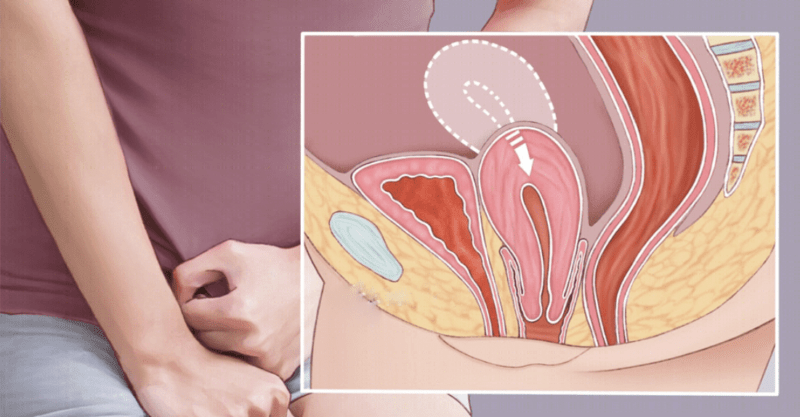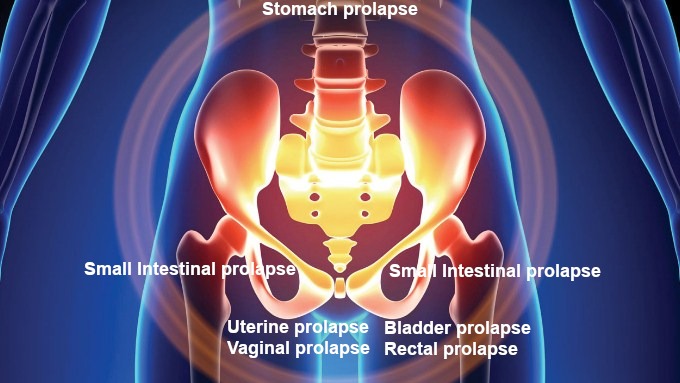Can pelvic organ prolapse be cured
Pelvic organ prolapse refers to the descent of one or more organs in the pelvis from their original position. It is also one of the causes of pelvic floor dysfunction.
Male pelvic organs include bladder and rectum, while female pelvic organs include uterus, uterine appendages, vagina, bladder and rectum.
Pelvic organ prolapse can be cured. The severity of pelvic organ prolapse is usually divided into grades 1-4, with grade 4 representing severe prolapse.
For different types and severity of prolapse, the symptoms will vary from person to person.
The severity of the prolapse and the strength of the individual’s physical constitution will affect how long it takes for the prolapsed organ to return to its original position.
Causes of pelvic organ prolapse
The main cause of pelvic organ prolapse is that the pelvic supporting structures such as muscles, fascia, ligaments, etc. become weak and loose, lacking sufficient support, causing the pelvic organs to prolapse from their original positions.
The causes of pelvic organ prolapse are divided into congenital tissue dysplasia and acquired tissue damage.
Congenital tissue dysplasia is due to congenital physical weakness, resulting in insufficient nutrition in the body. The muscles, fascia, ligaments, etc. here are not strong enough to support the organs.
Acquired tissue damage is due to acquired malnutrition, which causes the muscles, fascia, ligaments, etc. that support the pelvic organs to become weak without sufficient nourishment and cannot support the pelvic organs.
Among them, acquired factors are the main cause.
For example, acquired causes of female pelvic prolapse include:
- Due to obesity, chronic cough, bladder emptying disorder, uterine enlargement during pregnancy, early participation in heavy physical labor after childbirth, long-term constipation, etc., the load and pressure in the pelvic cavity can be increased.
Then the muscles, fascia and ligaments, etc. will drop accordingly, causing the position of various organs to move downward.
- Birth trauma, decreased estrogen levels during perimenopause / postmenopause and a history of pelvic surgery can damage and weaken pelvic tissue, weaken its support, and eventually lead to pelvic organ prolapse.
Regardless of whether it is due to congenital reasons, acquired reasons, or acquired trauma caused by gastric surgery.
The deficiency of qi and blood will cause the muscles, fascia, ligaments, etc. do not get enough nourishment.
They gradually become weak and slowly unable to support and lift the internal organs, resulting in prolapse.
The transformation of food into essence, blood and body fluid requires the participation of organs such as kidneys, spleen, stomach and lung.
Affected by the innate constitution and acquired care, the strength of each person’s kidney, spleen, stomach and lung is different.
Therefore the length of recovery time varies from person to person.
Different pelvic organ prolapse
Men/Women: bladder prolapse, umbilical hernia, inguinal hernia, femoral hernia, abdominal wall hernia, anal prolapse.
Women: Uterus, vagina.
Other prolapse such as stomach prolapse.

How do you know if you have pelvic organ prolapse
Through some physical symptoms, you can determine whether you have pelvic organ prolapse.
If you are not sure, you can go to your family doctor for further examination so that you can get timely treatment.
Mild cases of pelvic organ prolapse
Sometimes fatigue, low appetite often or even anorexia, bloating easier, long term loose stool or even diarrhea, occasionally anal prolapse.
Moderate to severe pelvic organ prolapse
There are obvious symptoms of discomfort, such as lumbar pain or a feeling of falling when walking.
When standing for a long time, doing physical labor, or doing too much activity, these symptoms will worsen, and some people will have bulging of the anterior vaginal wall.
More serious pelvic organs prolapse
- It will be accompanied by frequent urination, difficulty urinating, and a feeling of incomplete urination.
- Some people with bulging of the posterior vaginal wall will have difficulty defecating, reduced bowel movements, constipation, etc.
- People with more severe uterine prolapse will experience a foreign body sensation in the perineum when walking or sitting, and the cervix will be infected, ruptured, and bleeding if it is located outside the vagina for a long time.
- The prolapsed part of the anus cannot shrink back.
- The last stage of prolapse cause pain and diseases due to infection, etc.
Self-checking (male/female)
- A heavy, pulling sensation in the vagina, or low abdomen or lower back (male/female)
- A feeling of a hard mass in or outside the vagina (female)
- Urinary symptoms such as slow urination, incomplete bladder emptying, a feeling of frequent or urgent urination, and stress incontinence (male/female)
- Bowel symptoms such as difficulty passing a bowel movement or a feeling of incomplete emptying, or the need to put pressure to empty the bowel (male/female)
- Discomfort during intercourse, such as pain ( male/female)
- Some women will have bulging of the anterior vaginal wall.
- Men have difficulty urinating, bulging navel and groin, such as hernia, etc.

Why is my prolapse worse some days?
Our bodies have their own repair system. When pelvic organ prolapse is in the mild stage, the body can return to normal function as long as you take in enough nutrition and get enough rest.
When the symptoms of prolapse feel severe, it means that your body cannot repair itself and you must seek treatment.
How bad does a prolapse have to be before surgery?
Organ removal is not the best solution. If the root cause of prolapse is not addressed, the pelvic organs will sag in turn. How many organs can be removed?
Only by improving the physical condition by strengthening the spleen and stomach function can the weak muscles, fascia and ligaments be effectively repaired.
The pelvic organs can be supported and lifted.
Can a prolapse make you feel ill?
Pelvic organ prolapse can lead to pelvic floor dysfunction.
Symptoms of pelvic floor dysfunction include pelvic pain, pelvic pressure, sexual intercourse pain, urinary incontinence, overactive bladder, incontinence, incomplete emptying of stool, constipation, pelvic myofascial pain, etc.,。
As well as pelvic organ prolapse such as bladder, uterus, vagina, rectum, etc. Up to half of pregnant women will be affected, and up to 16% of men are also affected.
Timely treatment of pelvic organ prolapse can prevent pelvic dysfunction in time.
How do you fix pelvic organs prolapse?
The causes of pelvic organ prolapse involve the functions of the kidneys, spleen and stomach. Different therapies are used according to the severity of the problem.
For example, diet therapy, moxibustion, herbal medicine, acupuncture, etc.
These therapies are based on restoring the body’s ability to support internal organs without harming the body.
How long time will solve the pelvic organs prolapse?
Everyone has a different physique, different meridian sensitivity, different health levels, and different speeds of improvement, so the time length of treatment is also different.
Generally, mild level and middle level of pelvic organs prolapse will be a noticeable improvement after 1-6 months treatment.
Seniors are usually slower to recover than younger people. Severe level is slower than mild and middle level prolapse.
What happens if a prolapse left untreated?
What happens if I don’t fix a prolapse? – not a small amount people have this question in their heads.
Mild prolapse can be corrected with adequate nutrition or some herbal medicines. Some people is okay to live with a mild prolapse.
Severe prolapse can cause pain and lesions.
Some people only have very mild prolapse, such as urinary incontinence, mild anal prolapse, etc.
The condition does not continue to develop seriously, and the person does not feel any discomfort.
They can recover after a period of diet therapy.
There is a recover case of bladder prolapse for your reference.
More questions? you can walk-in for more answers in our shop locates at 2B-2220 Bowen Rd. Nanaimo, BC.


